Metcalfe Park Community Bridges (MPCB), a neighborhood organization that services Metcalfe Park residents, truly embodies the meaning of community. Melody McCurtis, the deputy director of priorities and lead organizer of the organization, explains that everything they do is based off of the input and direction of their residents. Whether that be surveys they conduct going door to door or following the advice given by board members that live in the neighborhood, the community speaks for their needs and the organization listens.
Mark Denning Lifts Native Voices with a Traditional Fire Ceremony
“For much of America, Milwaukee included, Native people are invisible. We are here and we exist,” states Mark Denning, who is an educator and community organizer of Native descent. To this day, Native people are still left out of the equation in American society. That becomes obvious when looking at the minimal amount of research studies and newspaper articles written about them. But Denning and his community refuse to let their voices be overshadowed. They are speaking up in the ways they know how—through fire ceremonies and shared offerings.
One Person Can Really Make a Difference
Of the many heroes in our city, Camille Mays stands out because of the tireless work she has committed to violence prevention and speaking out for our city’s underrepresented neighborhoods. She is a hero because dedicates every free moment she has to helping others. Whether she is supporting families of victims of gun violence, organizing a protest or assisting people to register to vote, she puts her community first.
Vaun L. Mayes Demands Change in Milwaukee
We are in the midst of a movement that is different than any other from the past, according to Vaun L. Mayes, a local activist in Milwaukee. People are organizing communities and marching on the streets to demonstrate the unequal opportunities that people of color have had in this country and to demand that our governmental systems change. “I think people’s involvement and enthusiasm about changing things is different this time. And this is one of the only times in history I think that most people agree that change needs to happen or that what we all saw was wrong,” says Mayes referencing George Floyd.
Keisha Robinson Reaches Out to Voters Year Round
Keisha Robinson grew up on the north side of Milwaukee and like many people in her community, she experienced hardships like poverty and discrimination while job searching. She eventually worked her way up to her current role as Program Director at Black Leaders Organizing for Communities (BLOC) where she uses her personal experiences to help the people in her neighborhood get involved in the political process. The team at BLOC believes that change needs to happen from within the community because sharing experiences creates a deeper level of trust.
Vivian King Leads Riverwest’s Kneel in Solidarity for George Floyd
On June 2, Vivian King kneeled for nine minutes in honor of George Floyd alongside at least 50 other people in Riverwest’s Gordon Park. A long-time activist, King learned about the national Kneel for Nine event the day before it happened. She planned to participate in the peaceful action taking place around the city but wanted to do so in her own neighborhood.
Valerie Carter is Helping Patients on the Front Line
Valerie Carter MD works as a hospitalist in Internal Medicine at Froedtert Hospital in Milwaukee. The job has its challenges on a regular day: determining the right treatments for severely ill patients and keeping them calm during uncertainty. But in the middle of a pandemic, Carter’s job has become drastically harder because she also has to manage her own anxiety. “It was a whole different ball game when this started because we didn’t know what this was and what the right treatments would be,” says Carter.
Kenyette Edwards' Graduation Day
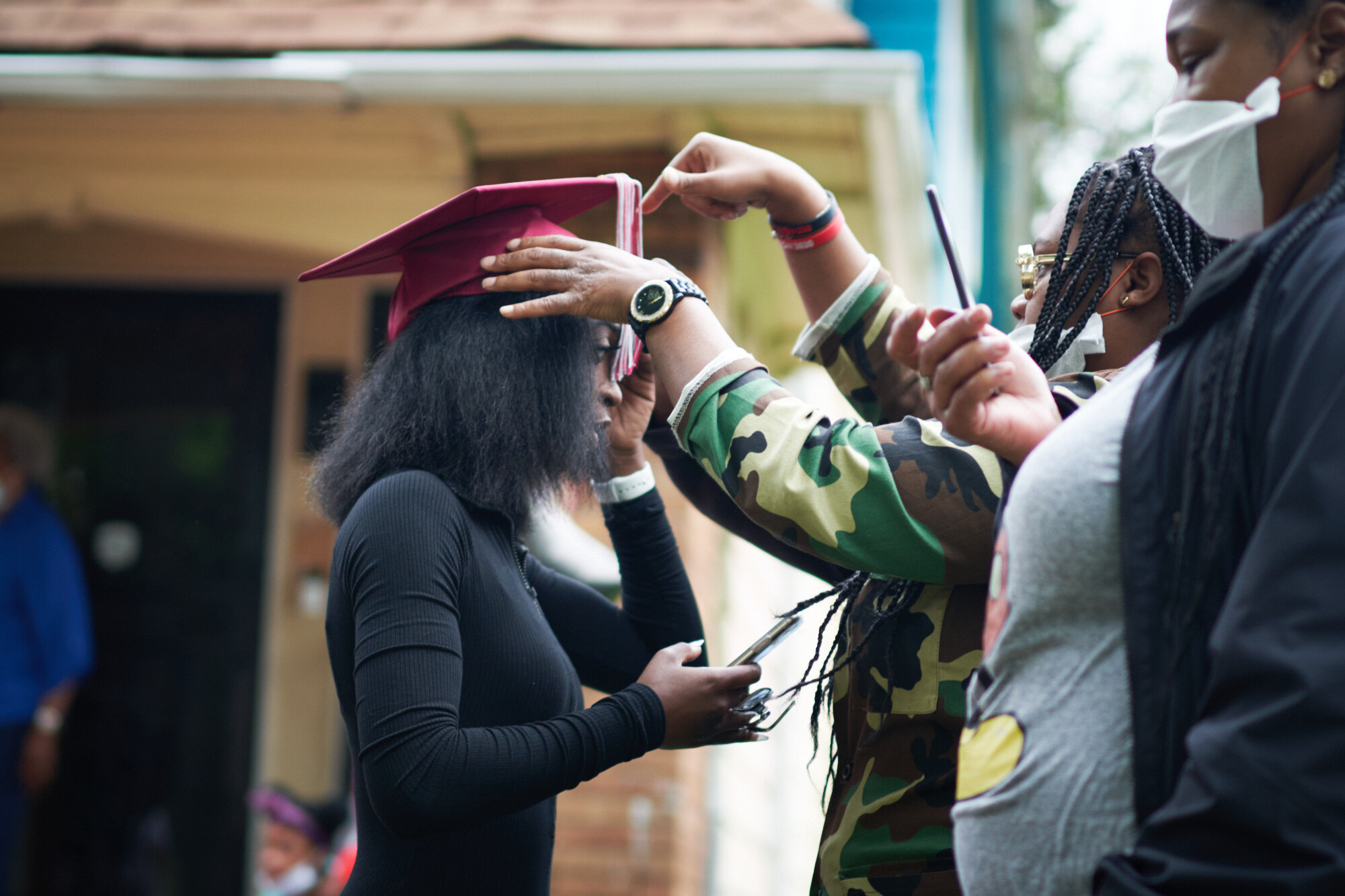

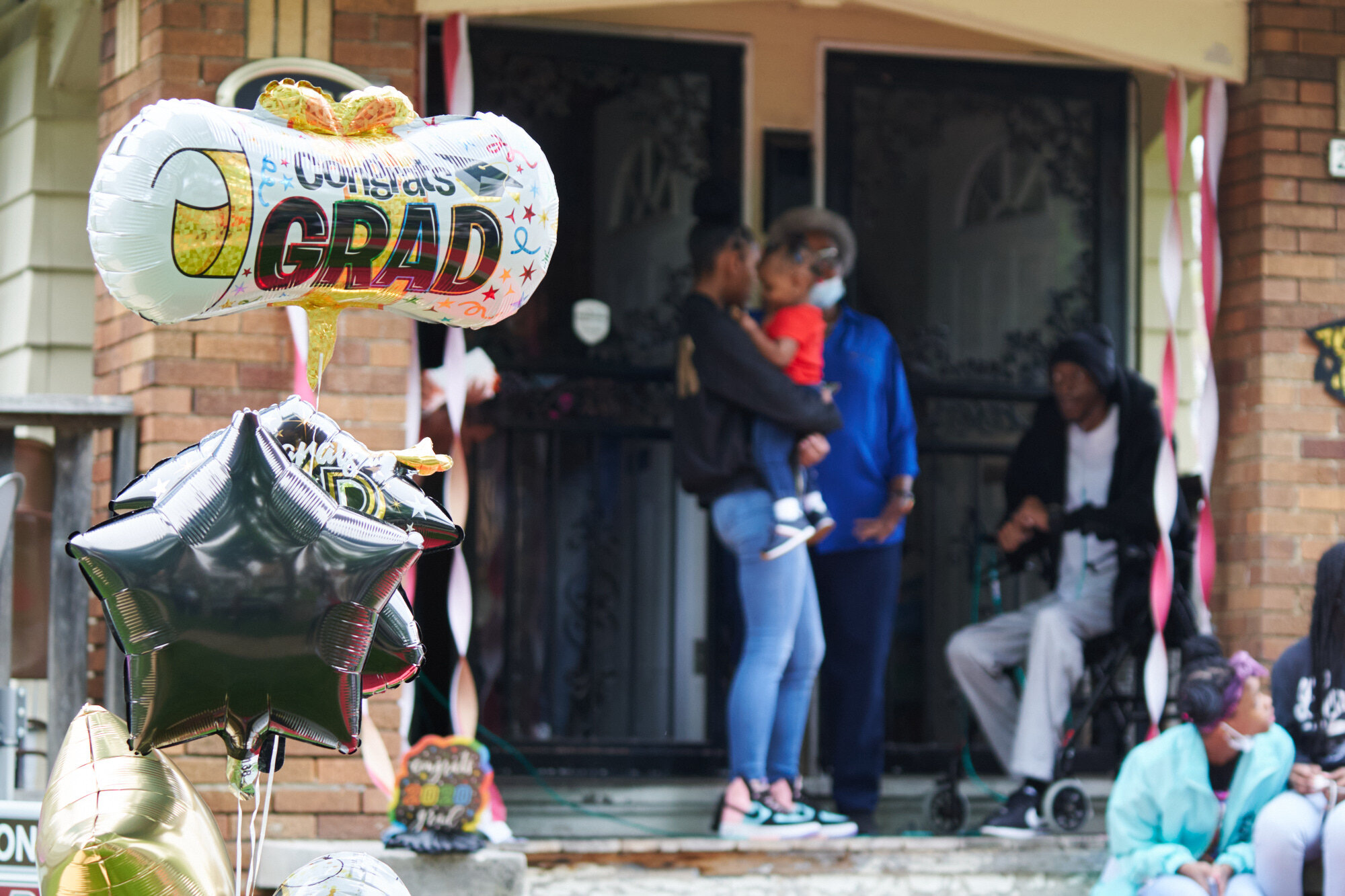
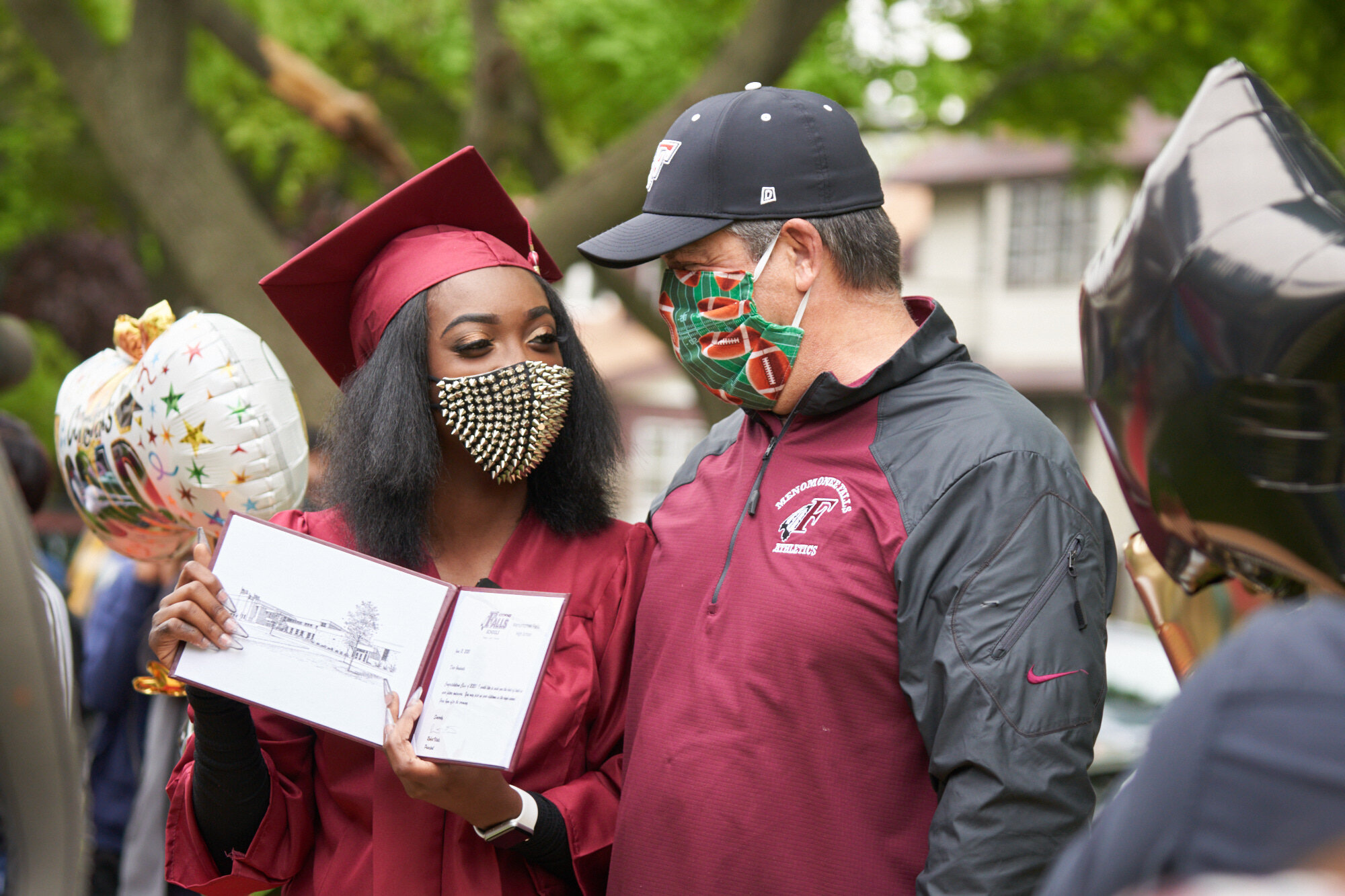
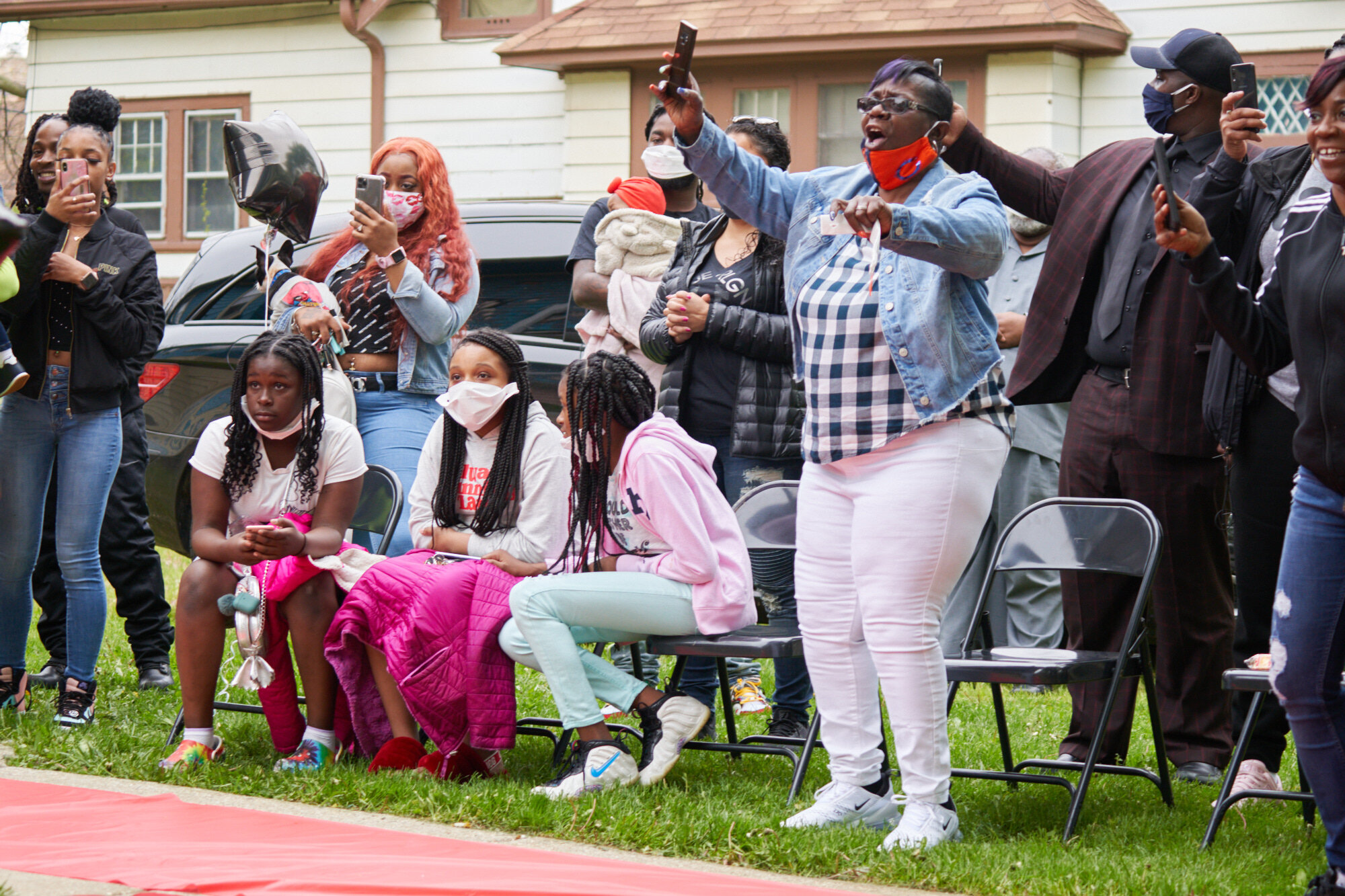
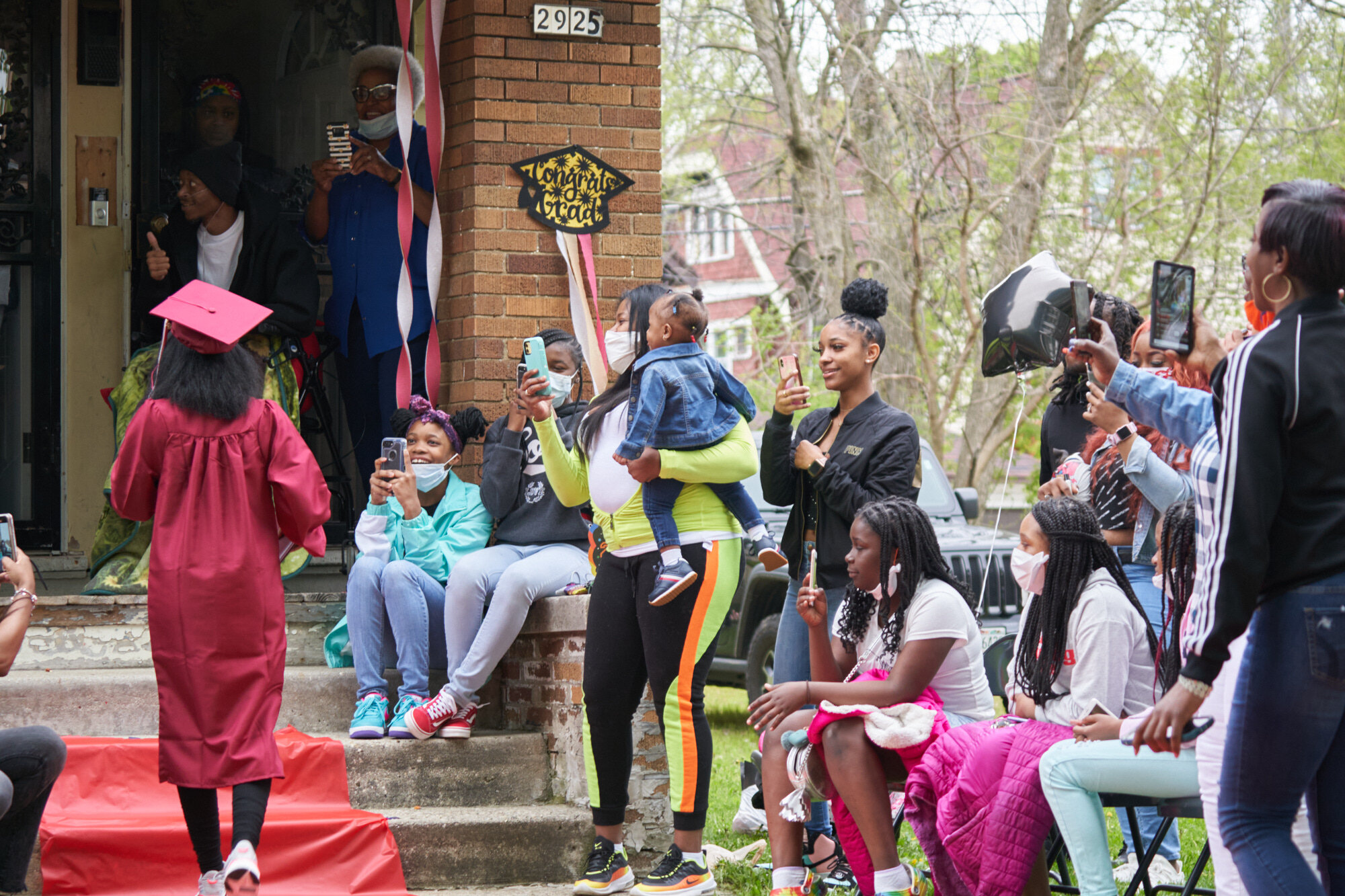
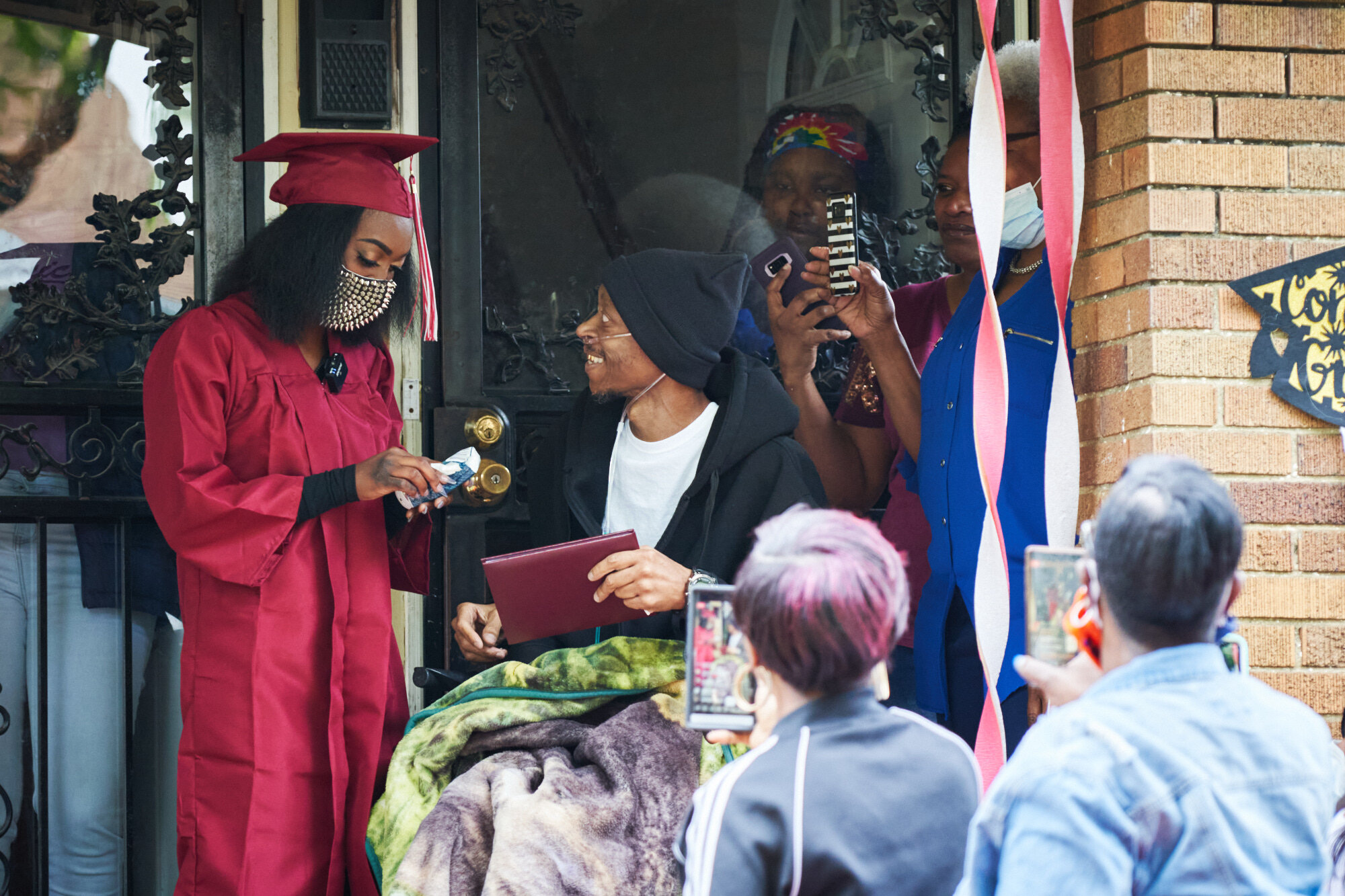
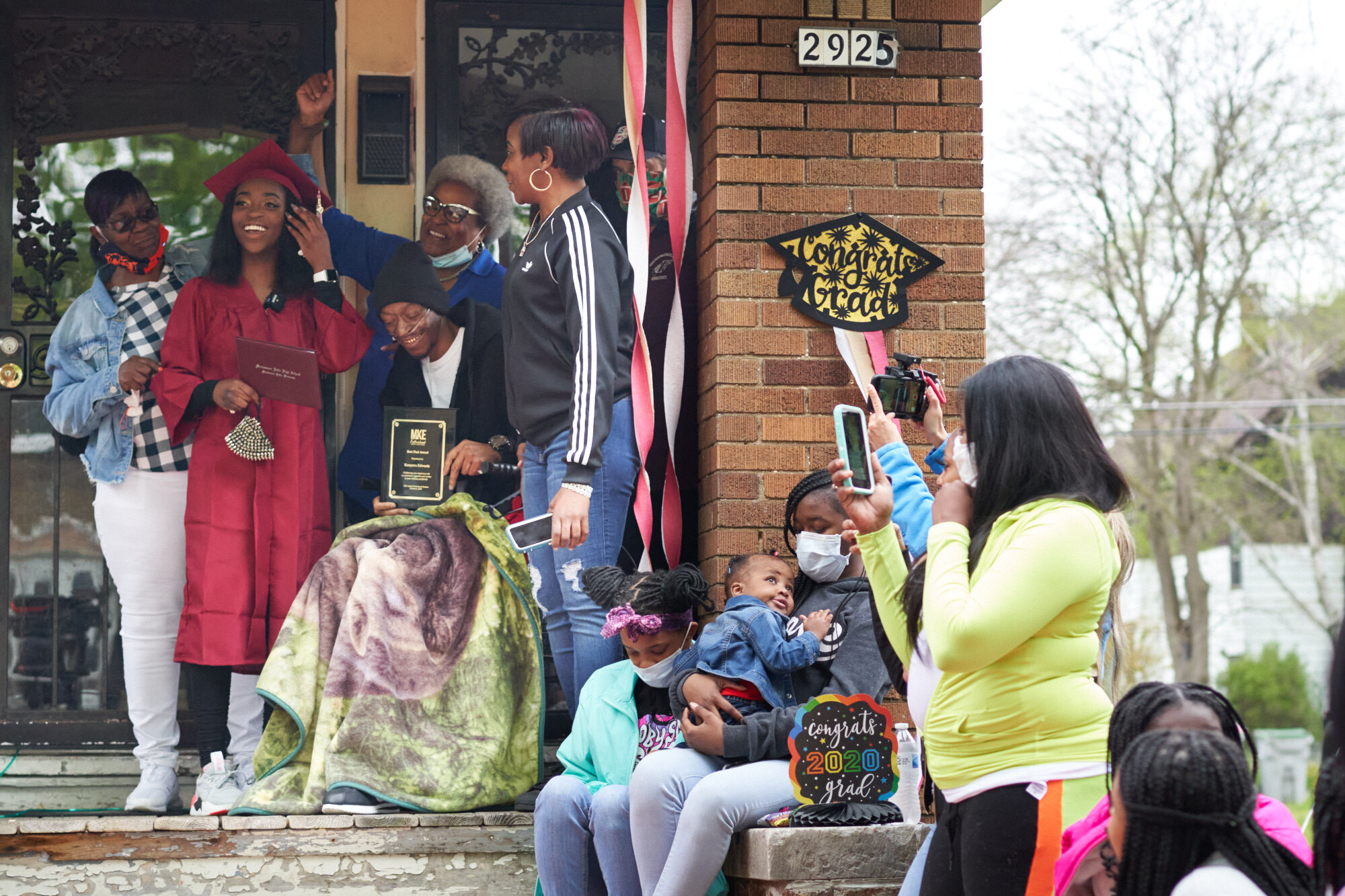

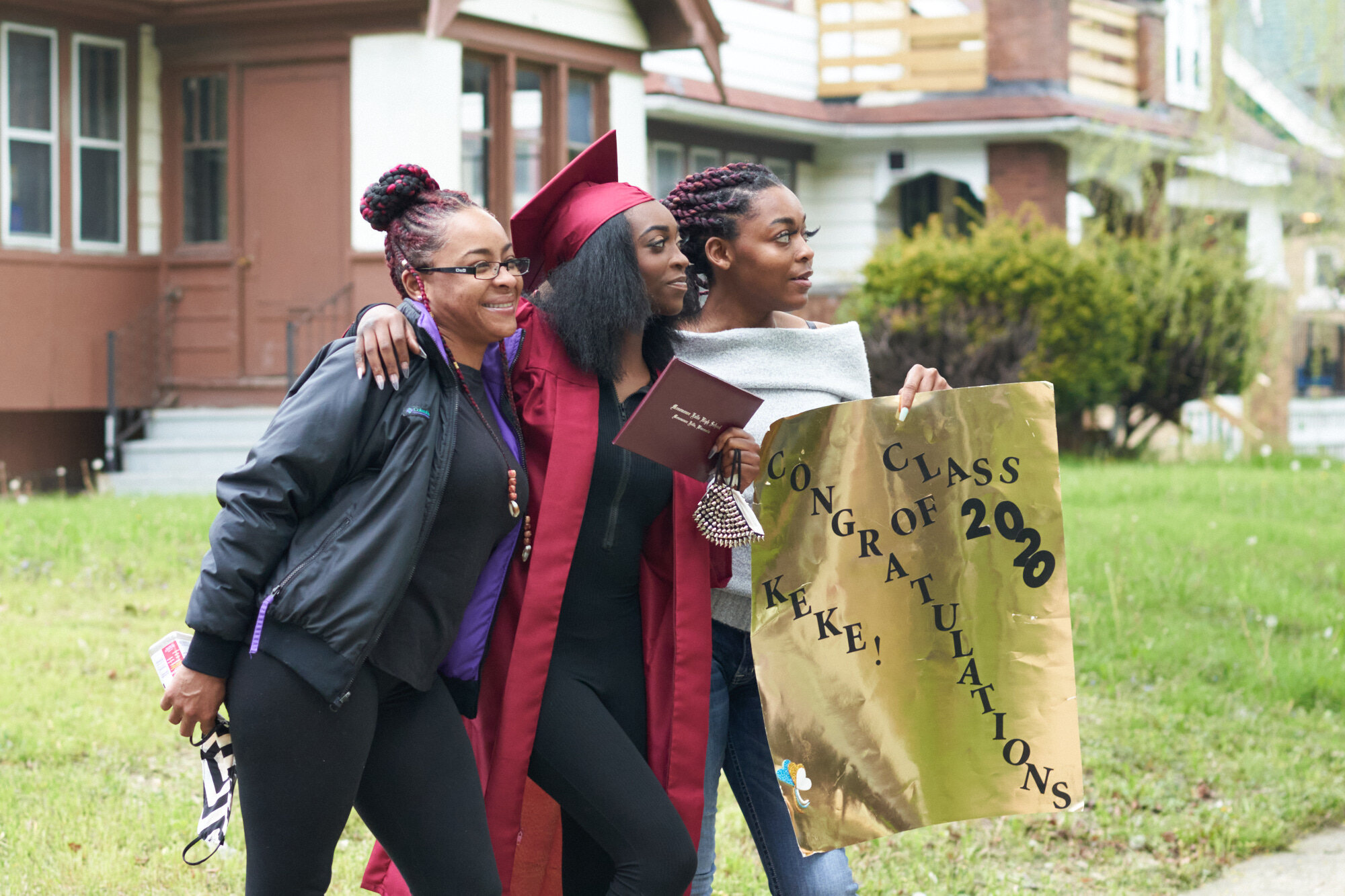
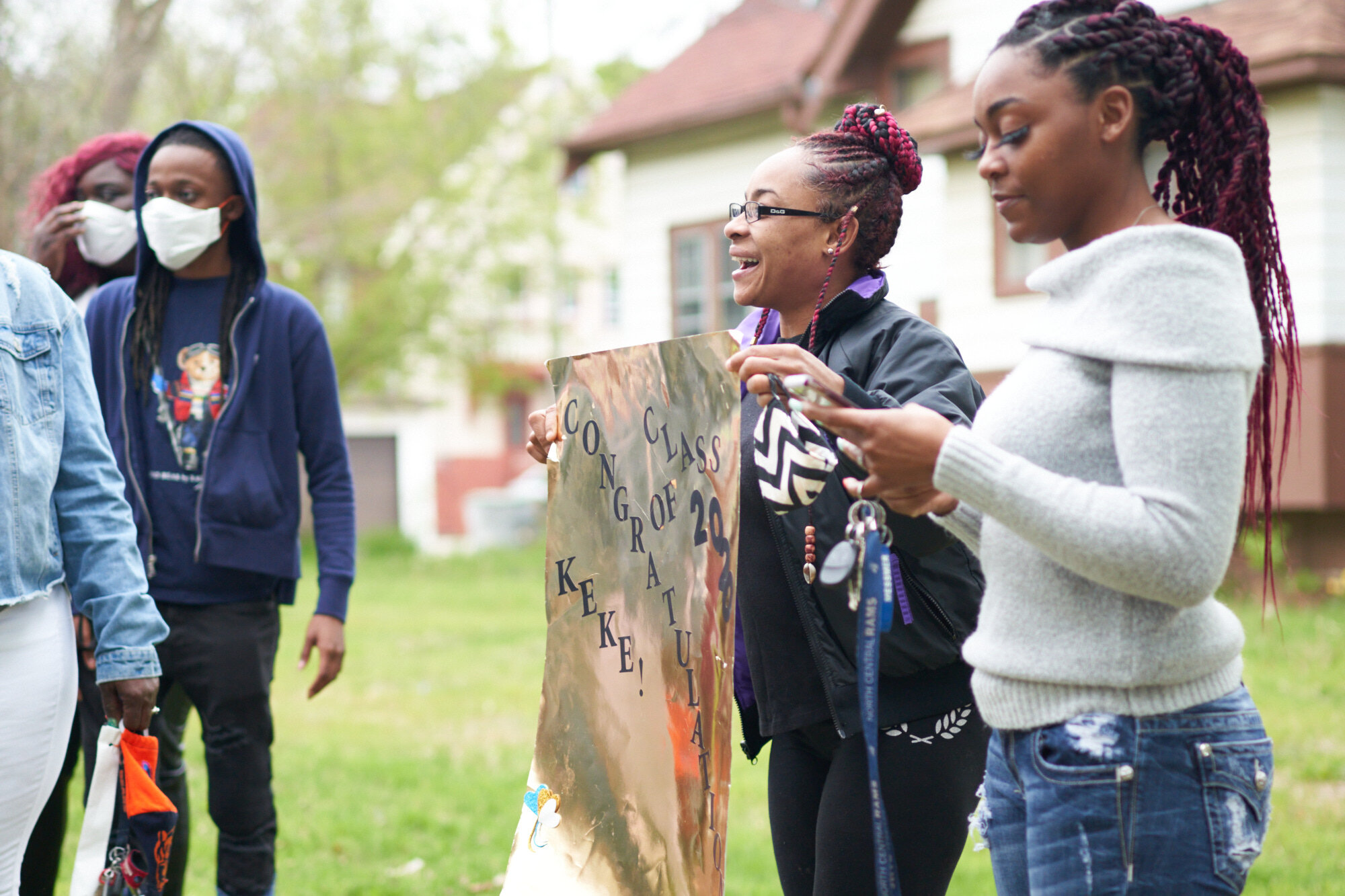
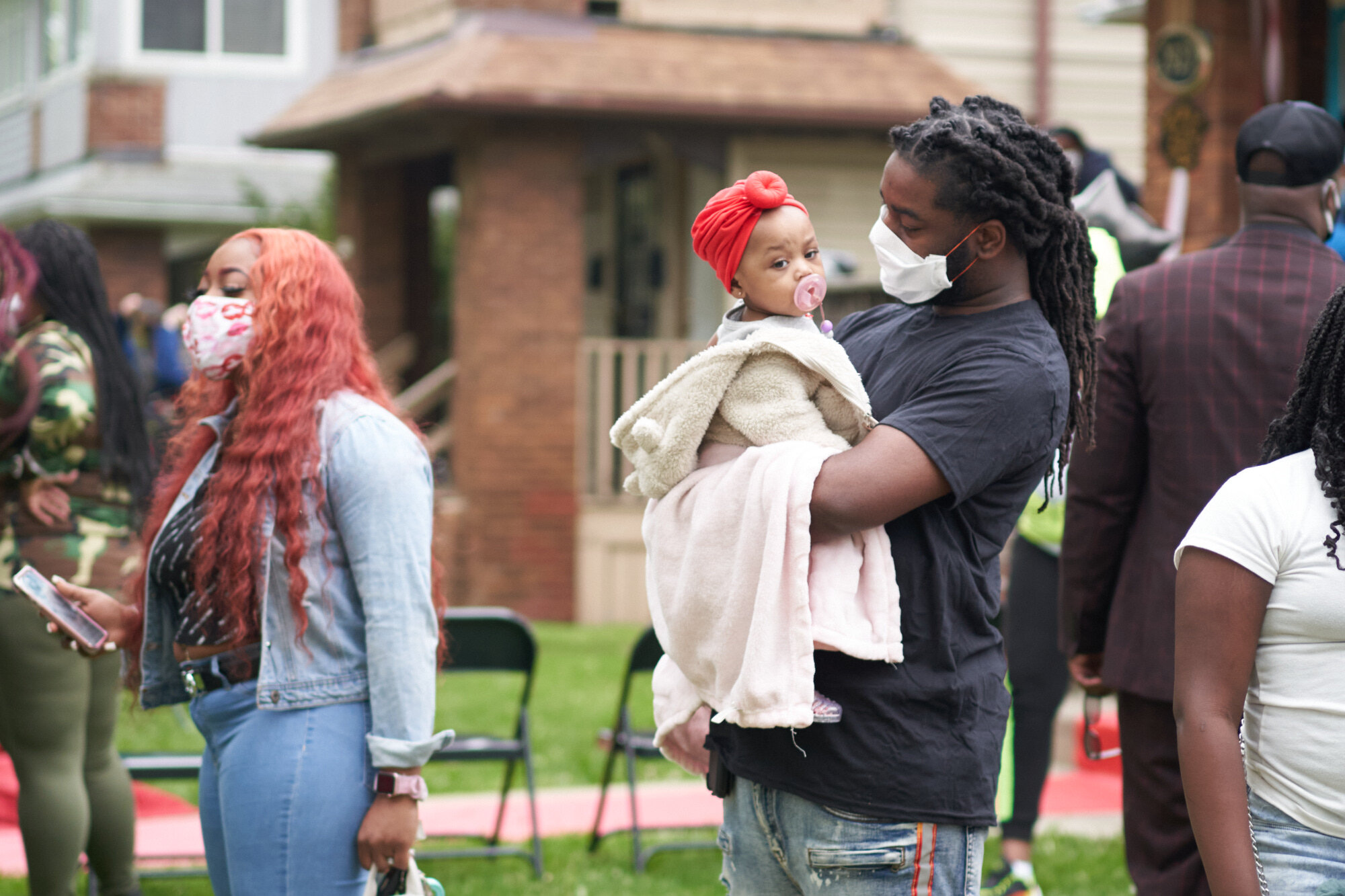
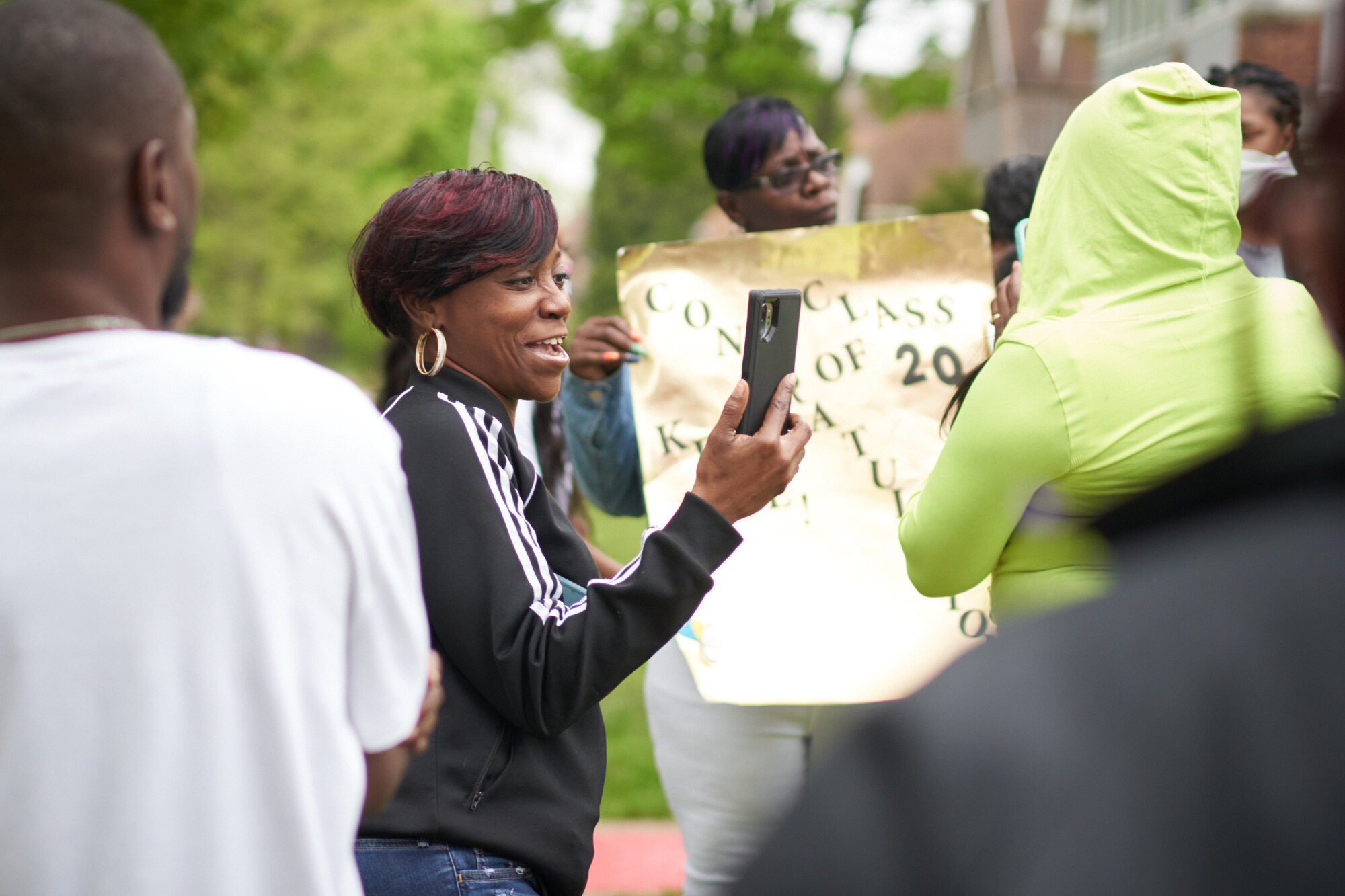
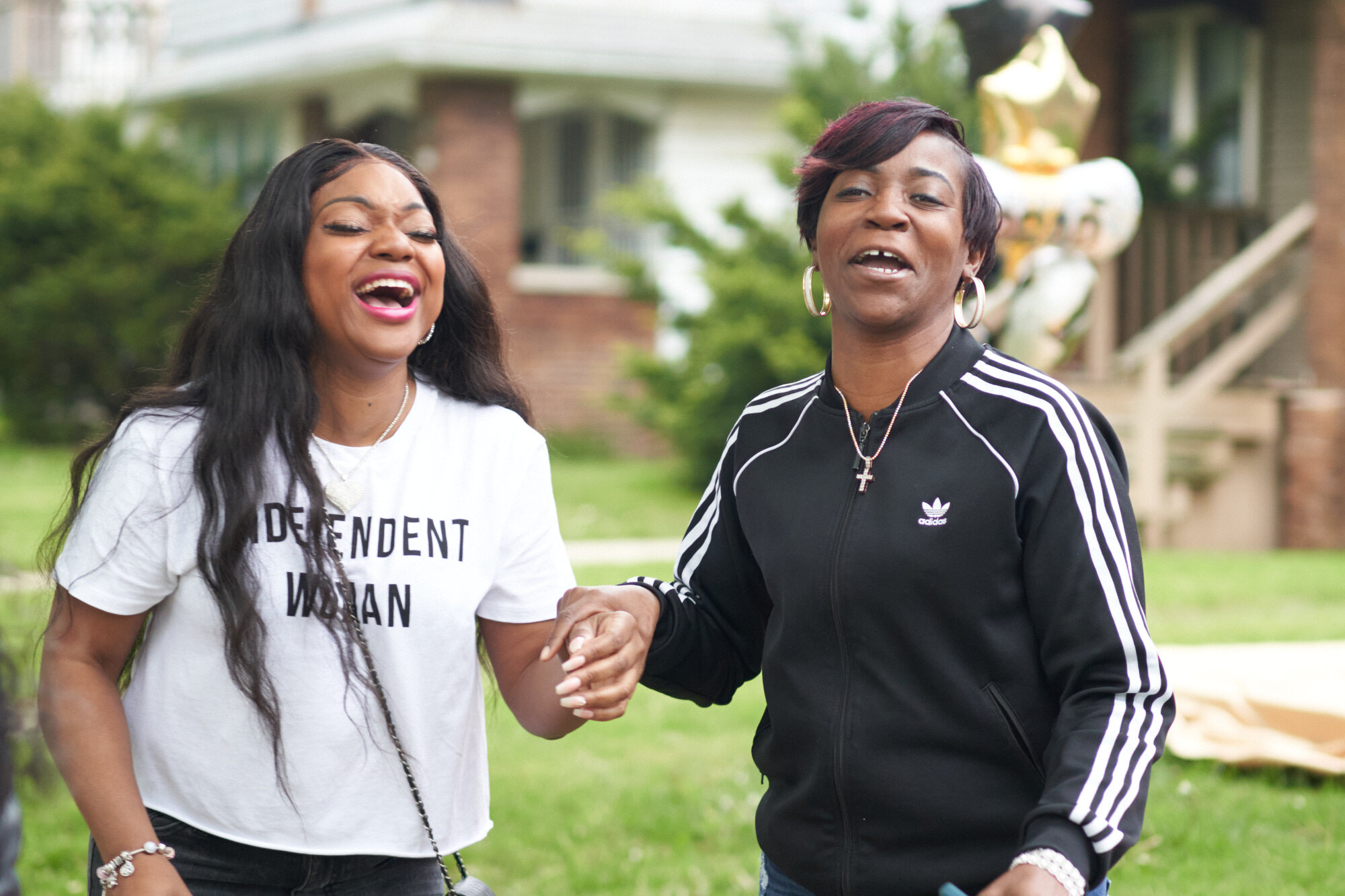
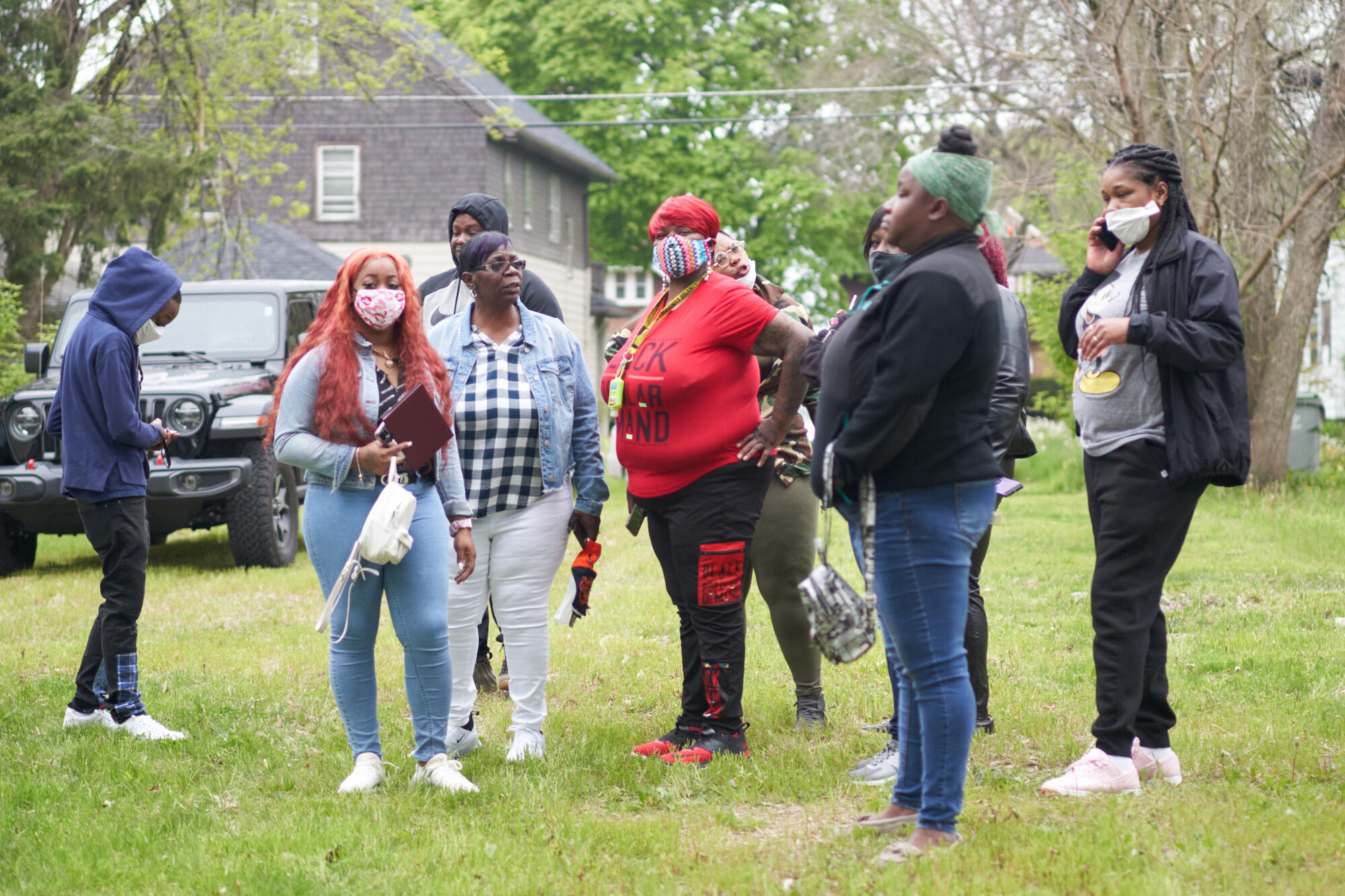
In the midst of a pandemic and a father battling stage four lung cancer, a family finds a way to celebrate the high school graduation of Kenyette Edwards. The Menomonee Falls High School virtual graduation is scheduled for the end of June, but Kenyette and her family knew that her father, Kenyatta Edwards may not live to see that day. Having never missed a graduation, the family was determined not to let him miss this one.
It didn’t take long for Kenyette’s mother, Natasha Dotson to organize a graduation in the front yard of Kenyatta’s home, where he is spending his hospice care. He sat outside on his porch as family members rolled out a red carpet and blew up balloons for the graduate. Aunts, uncles, cousins and friends gathered around the makeshift stage with masks covering their smiling faces.
Surrounded by a cheering family with cameras in their hands, Kenyette walked down the front porch steps to receive her diploma. Bob Vitale, principal of Menomonee Falls High School and a longtime mentor to the family, was there to present the diploma. “I’m so proud of her,” says Vitale as he holds back tears in his eyes. “We go way back; this is a really awesome family.” He helped Kenyette and her older siblings with hardships through school and made sure he was present for this special occasion.
After posing for photos, Kenyette walked up the front porch steps to her father to hug him and show him the hard-earned diploma. “This was better than doing the regular graduation because my daddy wasn’t even going to be able to make it so I’m actually happier that we did this instead,” says Kenyette. The intimate setting was filled with laughter that could be heard across the neighborhood. In this story of resilience, support and unconditional love, a smiling father got one more chance to tell his daughter how proud he is.
See the published article on the Shepherd Express.
Taking Action on Climate Change, Economic Equity
Wisconsin’s state government has taken sweeping action against COVID-19, enacting emergency orders and investing lots of money to stop the virus. Climate activists have been demanding this kind of governmental action for years. “Climate change is an equal if not greater threat than this pandemic, but this pandemic is now feeling real and scary to people,” says Janet Meissner Pritchard, an environmental policy lawyer and a board member of Citizen Action of Wisconsin. Activists like Meissner Pritchard and Ted Kraig are Milwaukee residents who have invested years of their lives working on the climate issue. More than ever, they feel it is important to continue that work during these challenging times.
County Supervisor Supreme Moore Omokunde is Optimistic on Milwaukee
Supervisor Supreme Moore Omokunde outside of the Milwaukee Public Library.
When we talk about local heroes, Supervisor Supreme Moore Omokunde comes to the forefront of many people’s minds here in Milwaukee. A member of the Milwaukee County Board of Supervisors representing District 10, Moore Omokunde has been a figure to look up to for years. In an interview, he talks about his experiences that eventually led him to run for office and what he believes an elected official is meant to do. He has an optimistic outlook for a better Milwaukee but explains that people must organize and know their neighbor in order to make their voices heard.
How did your background lead you to where you are today?
“I grew up in Midtown on the 1200 block of 25th street,” in the district his mother, Rep. Gwen Moore, once represented in the state assembly. His father, Rev. Dr. Tolokun Omokunde, was a Presbyterian minister who gave Supervisor Moore Omokunde a strong sense of self identity and an understanding of his African heritage. Moore Omokunde was heavily influenced by his parents, both of whom were very involved in community organizing.
As an adult, he began working with organizations that service youth in the city, providing them with more opportunities—nonprofits like True Skool, the Boys and Girls Club and Public Allies. That work stretched into other avenues of community organizing, such as helping the Sherman Park Community Association to establish local block clubs which gave people a way to voice their concerns.
What motivated you to run for office rather than staying in the nonprofit sector?
Moore Omokunde is passionate about his work he did with local organizations, but now as an elected official, he is able to represent his constituents and work to change policies based on their needs, or as he says, “be in the room where it happens.”
Since being in office in 2015, he has reallocated money to create safe zones in neighborhoods which helps prevents violence. Moore Omokunde worked with neighborhood groups, for example, to transform Tiefenthaler Park to an active community meeting space, preventing crime from occurring. Last year, he also helped kick off the Milwaukee City-County Joint Taskforce on Climate and Economic Equity, which aims to have net zero greenhouse gas emissions by 2050, while also minimizing the racial and economic divide.
What is the best way for everyday people to get involved and have their voices heard?
“It’s important to ask yourself, how well do you know your neighbor?” That’s the first step, explains Moore Omokunde. Community organizing is as simple as getting to know the people close to you, whether that’s your local block club, residence council, neighborhood association, etc. “At that level, connect with other people who have similar desires as yourself,” then as an organized body, make your concerns known to your local representative. “I think it’s really important to let people know that their elected officials work for them and give people the kind of representation that redirects the power back to themselves,” he says.
More than ever, our local communities need to continue to organize and stay connected. Supreme Moore Omokunde is running for reelection unopposed to represent District 10 on the Milwaukee County Board of Supervisors. Thanks to everyone that went out to vote on April 7th in the midst of these challenging times.
Learn more on the Milwaukee County Board website. Read this article on the Shepherd Express, part of the column “Hero of the Week.”
James Arms on a Mission to Improve Milwaukee
To make an impact on our communities, the first step we must take is to show up for the causes we care about, but James Arms took his passion for helping others a step further: He structured his business to work with companies whose missions involve improving Milwaukee.
Arms is an entrepreneur who has worked from the ground up to grow a successful graphic design and video business. Having lived in Milwaukee his whole life, Arms has been frustrated with the issues Milwaukee carries like inequality and segregation. So, his solution was to use the skills he learned to offer promotional materials to organizations that need assistance with outreach.
Arms grew up in central Milwaukee on 28th Street and began his career on the press floor at Quad Graphics. In those early years, he remembers traveling home from his factory job and being laughed at because of his dirty clothes. One day, Arms walked past a neighbor sitting on his porch who told him to ignore the insults and continue to work hard. The man said his hard work will be worth it. Arms remembered those words and held onto them when he needed encouragement.
Keeping that work ethic front and center, Arms eventually worked his way up through the company, taking every opportunity he could to learn extra skills and ask questions. In 2005, he left Quad Graphics to start his own business with the help of Debbie Lassiter, co-founder of the Convergence Resource Center (CRC). The nonprofit is focused on helping women in human trafficking find resources and now works nationally to help the cause. But at the time, the organization was new and in need of funding. Lassiter and Arms connected and built an image for the organization that showcased their dedication to the victims of human trafficking.
Arms was inspired by Lassiter’s vigor for her work and made it a goal to put that same energy into showcasing the CRC. In that process, he created his first logo, along with other promotional materials like brochures, print materials and videos. Everything he was creating was aimed at finding donors that would help the CRC with the funding it needed.
Early on, Arms learned the importance of connecting with his clients and understanding the problems they are working to solve. “You kind of just connect with the pain that they feel for what’s going on in the city,” he says. That connection is what gives his promotional products a strong message, helping nonprofits attract supporters.
Arms’ company, JL Promotions, continues to grow, and before accepting any new work, he asks himself, “Is this going to help somebody?” Since 2005, he has aided countless nonprofits by building an image for them that demonstrates the work they are doing for the city.
You can learn more about JL Promotions by visiting jlpromotionsonline.com.
Read the article in the Shepherd Express.
Jared Bell’s City Champs Brings Martial Arts to Kids with Less Opportunities
While training at a local boxing gym in Milwaukee in 2017, Jared Bell watched as a boy from Puerto Rico trained alongside him. The boy came from a difficult family situation but found boxing as an outlet. Bell witnessed that the physical exercise and discipline of the sport changed the boy into a strong young man full of passion and certainty. It was then that Bell realized the influence boxing and other martial arts could have on young lives.
Bell was inspired by this young man and wanted to help other youth lacking opportunities in Milwaukee. So, that year he started the foundation called City Champs, a nonprofit that provides scholarships to youth, allowing them to train at local martial arts gyms. “We want to come up with the simplest solution to solving a large societal challenge,” says Bell. His idea was not to create a brand-new gym, but instead to utilize the many gyms and seasoned trainers we already have in Milwaukee. Bell looked at studies showing that martial arts and boxing are successful means to help troubled kids. He wanted to use local resources to provide access to youth who otherwise wouldn’t be able to afford gym membership.
Martial arts and boxing teach discipline and respect. In the ring, opponents bow to one another or shake hands before beginning a match. Trainers stress that fighting is only used in competition or for self-defense. Initiating violence is unacceptable, and most trainers of the sports will not let their students practice if they break those rules. When youth come to train in the gyms, they are not learning to fight, but are learning control, focus and confidence.
City Champs started by partnering with the Sixteenth Street Clinic to offer an eight-week program where kids can try different martial arts disciplines at participating community centers. The goal of the program is to help kids build self-assurance and provide different training options that best fit each student. The participants who graduate from the program are eligible to apply for a one-year gym scholarship, which gives them a free gym membership, including access to the equipment.
In the last two years, City Champs has given away five scholarships with the help of generous sponsors. Bell has seen this intensive year of training and mentorship change the lives of the participants. Kids who were aggressive in schools, he explains, turn into hard-working students who have the confidence to achieve their goals.
Bell and the other dedicated people who have worked to build City Champs have no intention of slowing down. City Champs will soon have a course that Milwaukee Public Schools students can take at Bradley Tech High School. They are keeping busy writing curricula and developing new programs that will strengthen the self-esteem of our city’s youth, working to build up the future members of our community. “I want to leave something greater behind,” says Bell. “I think everybody wants to belong to something bigger than themselves.”
Learn more at citychamps.org.
Read the article on the Shepherd Express.
Monica Lopez Helping Parents of Special Needs Children
Born and raised in Guadalajara, Mexico, Monica Lopez never planned to leave her home, but when her first child was born, her and her husband’s lives drastically changed. Her son, Francisco Javier Jr., was born in May 1982 with cerebral palsy and at the time, Lopez could not find any services in Mexico for people with special needs. Like many immigrants, Lopez and her husband decided to move to America in search of a better life for their child. So in 1987, while pregnant with their second child, Lopez and her family boarded a plane in Mexico and landed in Milwaukee.
Her son was not diagnosed with cerebral palsy until she found a doctor in the U.S., but even in this country, there were not many services available for those with special needs in the 1980s. At the time, Lopez didn’t realize that she would eventually be a leader in the community, helping to develop a better array of resources for families.
Lopez explains the move to America being one of the hardest things she’s ever done. She had to leave the rest of her family behind and start a new life in a place where she didn’t know the language, culture or school systems. It was extremely difficult for her to find the necessary resources for her son, but with the help of a family friend, she was eventually connected with the right doctors and therapists. Those initial years in America were often isolating because she spent much of her time at home with her kids while her husband worked long hours.
The family got used to their new lives in Milwaukee, but in 1992 their fifth child, Ivan, was born with cerebral palsy. It wasn’t until then that Lopez learned English, got a drivers’ license and started getting involved with local organizations. She became a parent mentor with the nonprofit Healthy Transitions, visiting hospitals to talk with parents that had children with special needs. ”Being involved was helping me cope and find balance. I didn’t want to stay in the home all the time,” she says. While Lopez was preparing families for what to expect and where to find assistance, she realized that many of them had that same feeling of isolation that she experienced. The parents felt like they were the only ones going through hardships and didn’t know where to go for help.
So in 1997, Lopez started a support group for families who have children with special needs, showing them that they were not alone. After 10 years, the group became a non-profit called Alianza Latina Aplicando Soluciones (ALAS), specializing in aiding families whose native language is not English. The nonprofit provides trainings for families, hosts youth events and connects people with schools and doctors specific to their needs.“At one time, I was receiving a lot of services for my kids, and now I want to give those things to other families,” says Lopez. Motivated by her love for her children, Lopez has dedicated her life to increase the services available for children with special needs in the Milwaukee area.
Learn more at alianzalatinawi.org.
Read the article on the Shepherd Express.
Rafael Mercado and TEAM HAVOC Leverage the Power of Community
Sitting at a park bench in Clarke Square Park, Rafael Mercado, better known as Pancho, is proud when he talks about the surrounding neighborhood where he grew up. He points to the house across the street with a smile on his face that he can’t seem to hide.
“My brother owns that house there,” he says, then he points at the brick house further down. “There was a lady there named Ms. Robinson. We’d all go there, and she’d hand out candy.” Mercado describes the neighborhood as a lively melting pot where everyone knew each other when he was a boy in the ’70s. Then his expression changes and his cheerfulness fades as he begins to describe what the neighborhood has turned into.
Gang violence, crime, prostitution and illegal drug activity became prevalent. Mercado got swept up in gang life and committed crimes that eventually got him sent to juvenile detention. He was a good kid until he was molested by a priest when he was between the ages of 8 and 12. It wasn’t until he worked with a psychiatrist while in federal prison that he realized how much the experience influenced him to make poor choices later on in life.
“You feel like crap when you commit a crime, and you don’t know why you’re doing it,” he says. “Then you find out you’re a good person.” After making light of his own life, he began considering the many other people that have been through traumatic experiences and pondered ways to help. Once he was released from prison, Mercado returned to his neighborhood to find heroin addiction destroying the lives of relatives and friends. Within a nine-month period, he lost four cousins to the drug. To him, it seemed like no one was talking about the problem, so he took it upon himself to spread awareness and make a change in his community the only way he knew how.
With friends and neighbors, Mercado began passing out pamphlets to educate people about drugs, self-defense and places to go for assistance. He leveraged the power of community by recruiting people he knew who wanted to make a difference in the places they call home. A group of volunteers and he continue to knock on doors and walk up to sex workers, proving to be friendly faces in the neighborhood that will keep coming back.
“You gotta engage the community, get them involved,” explains Mercado. “You just keep coming, then they accept you.” That community service group became TEAM HAVOC, which stands for “Together Everyone Achieves More Helping Another Volunteer or Cause.”
The group meets in Clarke Square Park every Saturday to clean up nearby parks. On Friday and Wednesday nights, the group of volunteers meet from 7-10 p.m. to hand out pamphlets and other safety items like condoms and gun locks. TEAM HAVOC works with existing organizations to raise awareness about the issues mentioned and to show offenders that they will be welcomed back to their neighborhoods. Mercado has learned that the most effective way to stop people from committing crimes and taking drugs is to “let them know that they are part of the community.”
You can learn more about TEAM HAVOC on Facebook.
View the article on the Shepherd Express.
Tony Báez Challenging the Norms in Education
Tony Báez has always seen literature and education as ways to strengthen his activism and political arguments. As a young activist growing up in Puerto Rico, Báez looked up to prominent Latino leaders who fought for issues like Puerto Rican independence and civil rights. “We were reading their books and tearing up the literature of Latin America,” he says. He continued his education as a means to inform others on issues that need to improve, such as human rights and bilingual education. Now in his 70s, Báez is the director of the Milwaukee Board of School Directors, District 6. He continues to challenge the norms of school curriculums and push for teaching practices fair for all students.
In the early 1970s, Báez moved to Milwaukee and got a job at Milwaukee Public Schools (MPS). He helped develop the curriculum for bilingual education, a topic he would focus on for the next 40 years. Before Báez and other leaders of the bilingual movement began changing school curriculums, lessons were taught in English and translated into Spanish with no consideration for culture. Students who were not native English speakers were forced to assimilate, bettering their English but leaving behind their own cultural identity. Those students were not receiving an equal education, Báez explains, because they were forced to take standardized tests and learn standardized lessons that were not adapted to their culture.
With a committee of people adamant about incorporating bilingual education into schools, Báez and the group negotiated with MPS to implement new bilingual practices. The program was one of the first in the country and became a model for other states.
These issues are personal to Báez because he understands the challenges of trying to become part of a new culture. Originally from a poor neighborhood in Puerto Rico, he moved to Chicago in his early 20s. Worried for his safety because of his involvement in protesting the Vietnam War, his parents sent him to America. Almost immediately, he got involved with the Young Lords, a national human rights organization that fought for neighborhood empowerment and the rights of Puerto Ricans and other Latinxs.
For Báez, assimilation was never the answer. His experiences in Puerto Rico and Chicago taught him the importance of building a new cultural identity alongside one’s home language and traditions. He has always stressed that suppressing one’s culture hinders an individual’s potential and hurts a community. The bilingual education movement does more than help individual students, it helps create leaders for the future.
There are still improvements to be made to our education system so segregation does not cripple the opportunities of specific groups of students. And Báez does not plan to slow down his work. “To do the right thing for everybody is going to require that we change how schools function,” he says. “I think that’s what my role on the board is going to be. To keep pushing for that.”
Visit mps.milwaukee.k12.wi.us to learn more about MPS’ Bilingual Resolution.
View the article on the Shepherd Express website, part of my regular Hero of the Week column.
Venice Williams Cultivates Food and Community in Alice’s Garden
Aware of the significance a bridge has in connecting two places, crossing bridges is an integral part of Venice Williams’ identity. Originally from Pittsburgh, the city of bridges, she grew up walking across them to get everywhere. Years later, Williams describes herself as a bridge between communities. She has made it her life’s work to connect different groups of people, helping them “bridge their uniqueness,” she says. Today she runs Alice’s Garden, an intersection of the many neighborhoods in Milwaukee.
Williams began her community work through the Lutheran Church, always using her love of food and gardening as a way to bring people together. From a young age, she learned to grow plants in her family garden. Her father was a chef, her mother a grocer. She learned the importance of cultivating her own food and having a connection to the soil. As an adult, she works to teach others that same value.
Expecting to stay for only two years, Williams moved to Milwaukee in 1989 to pursue her ministry work. She found it hard to leave the city after quickly building relationships with the people she worked with. Still in Milwaukee 13 years later, she found her way to Alice’s Garden, a community garden since the early ’70s. Located on 21st Street and Garfield Avenue, the garden presented the perfect opportunity for Williams to marry her passion for food and building community relationships. Alice’s Garden is now part of her ministry called The Table. Even as the executive director of the garden, she still calls herself the “the weed puller.”
Alice’s Garden has become a center point in the community. It is a place where people of different cultures and ethnicities intersect to celebrate their similarities through food. “Everyone wants to come to this piece of land to cultivate food, but you’re cultivating community just as much,” explains Williams. There was a point when you could tell the ethnicity of a gardener based on the crops they grew. Now the garden plots are diverse like the gardeners cultivating them. With a multitude of programs focused on food and spending time outdoors, Williams has helped people share their traditions and cultures.
The garden comes alive with programs and events during the growing season. Events like yoga classes, meditation walks, group book readings and drum circles all take place in the garden with “the sky as the ceiling,” says Williams. “We create a stronger bond with each other and with the land when we are in the open air,” she explains.
Williams believes “authentic development comes from within a community,” meaning the garden structures its programming based on what the local neighborhoods say they need. Cultivating change is a group effort, requiring help from community members and partnering organizations. Everyone involved with the garden has redefined what a community garden can be, bridging the diverse parts of a segregated city.
Learn more at facebook.com/alicesgarden
Cendi Trujillo Tena: Honoring the Voices of Youth While ‘Igniting Transformation’
Cendi Trujillo Tena is soft-spoken and humble, but as soon as she starts talking about the youth she works with at Leaders Igniting Transformation (LIT), her eyes light up, and you can hear the passion in her voice. Trujillo Tena has worked with young people at other organizations in the city but explains that their voices aren’t always honored or valued. However, at LIT, the number-one goal is to put power in the hands of the youth and teach them how to advocate for themselves.
The young organization started in January 2018, fueled by the issue of the school-to-prison pipeline. At least 12 Milwaukee schools have metal detectors and law enforcement officers who are enforcing school policies with the use of restraints and seclusions. Those schools predominantly serve students of color. Many see the added security as an answer to the violence and disruptions occurring in the schools, but the founders of LIT see it differently.
In April 2018, the organization partnered with the Center of Popular Democracy to publish a report that looks at the outcomes of these extra security policies. They found that there were much higher expulsion rates among black and brown youth and those with learning disabilities. According to the report, 80% of suspensions were of black students, and 85% of referrals to law enforcement were black students, but only 53% of total students enrolled were black.
Let that sink in for a moment. As a student of color, you are far more likely to be suspended or get involved in the criminal justice system. The report shows suspensions lead to lower academic performance, a higher likelihood of dropping out and a higher chance of being entangled in the criminal justice system. Rather than tackling these issues alone, Trujillo Tena and the staff at LIT decided that the youth being affected should be the ones making the decisions.
When Trujillo Tena came on to the team, she emphasized that “the youth have to be in every step of the process.” LIT now has chapters of students advocating for their rights located in Milwaukee Public Schools (MPS) high schools with high security. The leaders in the organization start by building trust with the youth. Then, they teach the students about the school-to-prison pipeline and show them that these practices are unjust. Together, they have created the Youth Power Agenda—an action plan that presents an alternative to harsh discipline practices. The adults let the youth take it from there.
“They are the ones who decide what they want to bring up and what they see as the solutions to these issues,” Trujillo Tena says. LIT simply provides a platform to amplify their voices, such as taking the students to Madison, Wisc., to let them speak with their elected officials. Trujillo Tena and the staff understand that the youth’s experiences are real, and that their values matter just as much as any adult’s. “I let them lead, and they know what they are doing.”
Learn more about LIT by visiting litmke.org
Christie Melby-Gibbons: Serving Community (and Healthy Meals) at Tricklebee
When walking into Tricklebee Café, light fills the space and there is an energy that is inviting and calming. Patrons are engaging in conversations, children are running around, acoustic music is humming through the speakers and a smell wafts from the kitchen that makes you want to stay forever. This is the atmosphere Christie Melby-Gibbons and her family wanted to create when opening a café in a neighborhood that has been neglected. “It’s a safe spot and people can feel that when they come in the door,” says Melby-Gibbons. Tricklebee has become a cornerstone in the community, providing both healthy food and a support system.
The goal when opening the non-profit café in 2016 was to make healthy food accessible to an underserved community. New to Milwaukee in 2015, Christie Melby-Gibbons and her family searched a little differently than most would for a new place to live. “We looked for places where poverty is very common,” says Melby-Gibbons. So, they opened the café on North Avenue and 45th Street. Obesity and diabetes are also common in the area, which Melby-Gibbons believes has a lot to do with diet and few sources of healthy food. According to the Wisconsin Health Atlas created by UW-Madison's School of Medicine and Public Health, the 53210 zip code has a 49% obesity prevalence, meaning almost half of adults in the area are obese.
When the family first moved to the area, it was quickly apparent that there were no healthy or fresh food options. In fact, the only fresh produce Melby-Gibbons could find nearby was rotten vegetables in grocery stores. Wanting to help people in the neighborhood combat those health issues, the family made sure anyone could eat their vegan and organic food by allowing people to pay what they want. “We want to make sure that people have access to the foods that are available in other parts of the city.” says Melby-Gibbons. “In Shorewood and East Milwaukee, there are lots of healthy places to eat, but around here there’s nothing.”
Over the last two-and-a-half years, Melby-Gibbons has seen changes in the health, diet and overall attitudes of her regulars. Before Tricklebee opened, many of her customers only ate processed foods, but the café opened their eyes to new options for eating. All of the restaurant's food comes from its garden plot next to the building or from donations. The café-goers see the ingredients for their meals pulled from the soil and brought to the kitchen—that creates a trust that is hard to come by. Melby-Gibbons wants her customers to see how easy it is to eat healthy and to make those choices part of their normal routines.
To Melby-Gibbons, food is more than something to eat; it is an opportunity. She has used food to lift spirits, strengthen a community and show her neighborhood that someone cares for their well-being. "This is my real calling,” she says. “To get food out of the waste stream and into people’s bellies, especially in places where people can’t afford it... So, we did it and it’s working.”
Learn more at tricklebeecafe.org
Angela Lang: Working for Community Engagement in Politics
“Milwaukee inspires me and breaks my heart every day,” says Angela Lang, the executive director of Black Leaders Organizing for Communities (BLOC). “It is such a beautifully complex city and it’s full of potential.” Interacting with people in her community almost every day, Lang sees immense hardships but also uplifting resilience. She is the kind of person who witnesses struggles in her neighborhood and feels moved to take action. In her eyes, there is a path for change and a way to achieve a better future. “All we have to do is tap in and engage folks in a really meaningful way,” she says. By organizing her community and encouraging participation in the political process, she gives others the power to fight for their rights.
Lang grew up on 32nd and Wisconsin, well aware of the dichotomy of the neighborhood’s low-income housing in the shadow of Marquette High School, a school most of her friends would never be able to afford. She also watched as her single mother struggled with breast cancer while working multiple jobs. These early experiences made her aware of the inequality, but at the time, she didn’t know the term “racial justice.” It wasn’t until she got to college that she started to truly understand the political system and what she could do to fix the problems she grew up with.
Fast forward to 2017, when Lang and five elected officials (Sen. LaTonya Johnson, Rep. David Bowen, Ald. Chantia Lewis, County Supervisor Supreme Moore Omokunde and County Supervisor Sequanna Taylor) founded BLOC, an organization aimed at getting the black community involved in the political system. The BLOC leaders felt they needed more people in their community to vote, or if they couldn’t vote, engage in some way. Their first step was to ask folks what they wanted to improve in their neighborhoods. After hearing the concerns of everyday people and taking time to understand their hardships, BLOC began training canvassers (or ambassadors, as BLOC calls them) to educate citizens about the political system. “Sometimes, people just see the effects of policy but don’t know how to interject and make their voices heard in such a complicated system, so we’re trying to break some of that down and do some of that education,” Lang explains. BLOC is helping to put power in the hands of the people to create a thriving place to live.
The African American community has been left out of the political agenda, especially on Milwaukee’s North Side, which is why Lang explains that BLOC is “targeting black folks in a very bold and unapologetic way.” BLOC is changing that narrative and listening to the stories being told by their community. As of the election on April 2, they made 51,587 door attempts since Feb. 26. “How are we uplifting each other?” Lang asks. “How are we talking about the issues? How are we putting pressure on elected officials?” For Angela Lang, sitting back and waiting for society to change is not an option. There is power in numbers, she explains, and to build a thriving city, we have to get involved.
Learn more at blocbybloc.org
Convergence Resource Center Helps Women Inmates Reintegrate Into Society
More than 40 years ago, Debbie Lassiter began going into prisons to work with women who were lonely and in need of someone who would listen to their stories. Driven by her faith, her work in prisons began with bible studies, but she soon realized that the women needed more assistance that that; they would tell her: “When we get out, there’s nothing to help us keep moving forward with a different kind of life.”
The women would explain to Lassiter that, once released from prison, it was safer for them to reoffend and get sent back to prison than it was for them to stay out. After being released from prison, these women would often be in dangerous relationships or dealing with trauma from experiences like human trafficking. They couldn’t find resources that would help them get out of their harmful situations.
In 2003, Lassiter and Carly McKiver responded to this need by founding Convergence Resource Center (CRC), which is a faith-based community service and non-profit organization. It started as a call center with the sole purpose of finding the resources that women needed. At the time, there was only one person answering the phone and responding to letters written from local prisons. Two days after they opened, Lassiter got a call on her cellphone notifying her that there were more than 20 women standing at the door; these women had nowhere else to go. The overwhelming amount of calls—along with the long wait times women were experiencing with the available resources—led the organization to offer its own services.
“We started offering services, which meant we didn’t get a lot of sleep,” says Lassiter. CRC always responded to the needs of the community and evolved to offer programs that were some of the first in the country. They were the first organization in the U.S. to use HearthMath to treat human trafficking survivors, which is a science-based technique used to help people build personal resilience after a traumatic incident. The organization’s programs continue to provide support for those recovering from trauma, specifically female survivors of human trafficking and formerly incarcerated women.
At the core of their organization is the call center, which has been operating since the beginning. The call center provides a warm line of support, meaning it has trained specialists who will take the necessary time to speak with the caller. These specialists can refer callers to a network of trusted organizations that the CRC has partnered with throughout the years. CRC relies on those trusted relationships because, as Lassiter explains, no one organization can solve this problem alone.
Throughout her life, Lassiter has helped people with a range of hardships and traumatic experiences, which has taught her not to look at what people actually did, but what they were trying to do. Through patience and understanding, Lassiter and the CRC have helped hundreds of women accomplish what they were trying to do. As she explains: “When people feel valued, there are almost no limits to what they will do.”
For more information about the CRC, call 414-979-0591 or visit convergenceresource.org

